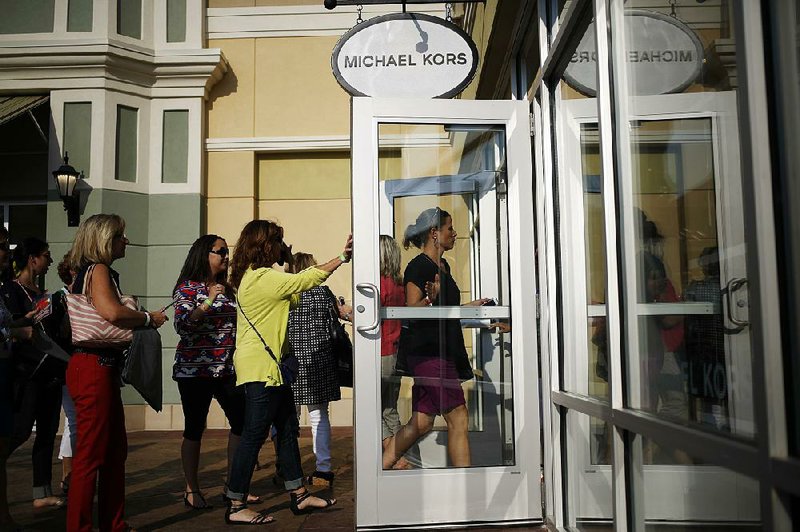Michael Kors, the accessible luxury retailer best known for its leather handbags, delivered the kind of earnings report Thursday that many retailers would consider the stuff of dreams: Revenue soared nearly 30 percent and profit rocketed 24 percent in the most recent quarter. Sales at stores open more than a year increased 8.6 percent, and online sales rose 76 percent.
But investors looking toward the future were unimpressed, sending the company's stock down more than 2 percent by the end of trading Thursday.
Kors went public in December 2011, and it was on a rocket ride from the start.
Customers were clamoring for what the company calls its "jet-set luxury" look -- $398 crossbody tote bags and $185 aviator sunglasses meant to make you feel like a fabulously wealthy executive ducking into your private plane for a lavish vacation in Turks and Caicos. Kors is often credited for deeply wounding Coach, another titan of affordable luxury who suddenly found itself losing market share to its younger rival.
As its products gained buzz and the IPO gave it an infusion of capital to grow, Kors expanded aggressively, its store count mushrooming from 231 in 2011 to 703 in 2014. The company was consistently seeing stratospheric comparable sales growth; in the second quarter of fiscal 2013, that figure soared as high as 45 percent.
And so for Kors, this most recent earnings report is still solid, but it represents a serious slowdown from even one year ago, and the company said its growth would continue to slow in the current quarter.
In other words, it appears Kors is becoming a victim of its own success: Its extraordinarily speedy growth made its products accessible to a vastly larger audience, and as a result, the brand began to lose the veneer of exclusivity that is so essential for a luxury brand.
Investors have seen this movie before.
Coach, a brand with a similar price point, was on a hot streak in the early 2000s and used the momentum to blanket the country with Coach Outlet stores that offered the handbags to a less affluent shopper. When wealthy shoppers began to see those little bags bedecked in the letter "C" draped over seemingly every other woman's shoulder, they started to snub the brand in favor of something that felt more uncommon.
For a while, they found that with Kors. But analysts now say Kors is suffering from the very same problem, particularly in North America.
On a conference call with investors Thursday, chief executive John Idol said the company had to resort to cutting prices in its home market in the most recent quarter, which took a toll on profit. The discounts may be a symptom of the ubiquity problem: The trendy customer who might have paid full price for the bags a year or two ago has moved on to other brands.
"Ubiquity is always an issue for high-end labels, and while we do not believe this poses an immediate threat, it is something that could weaken the future performance of Michael Kors," said Neil Saunders, chief executive of retail consultancy Conlumino, in a research note.
Kors is still seeing enormous growth overseas, with a 72 percent increase in quarterly revenue in Japan and a 72 percent increase in Europe. The brand has a significantly smaller presence in those markets, so perhaps if it loses more cache in North America, it can continue to draw profits from places where it still has an aura of newness.
As Kors tries to reach a wider audience but also retain its luxe status, it also faces a challenge in identifying the right mix of merchandise. For example, Idol told investors Thursday that a bucket bag in its most recent line didn't sell very well. The bucket style was incorporated because that shape was hot among high-fashion types, and yet it just didn't catch on with a broader audience of aspirational shoppers.
"Every now and then, you're going to get it wrong," Idol told investors.
SundayMonday Business on 02/08/2015
